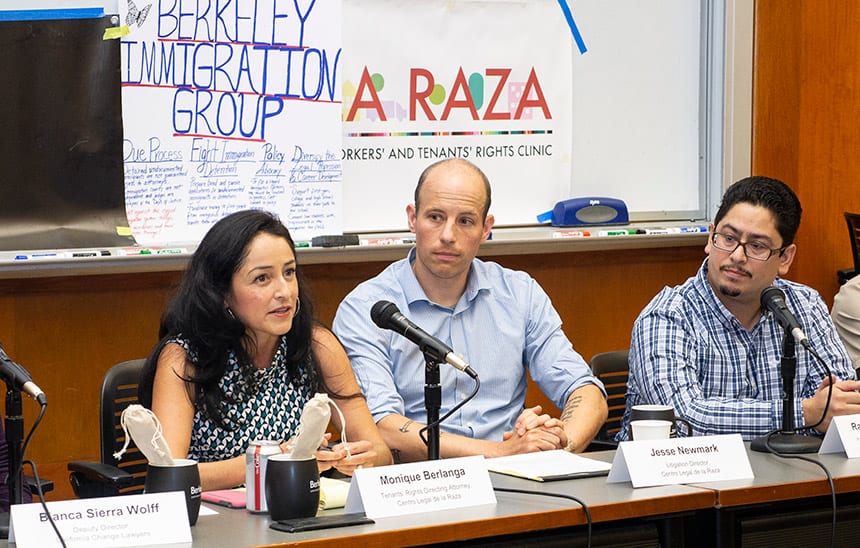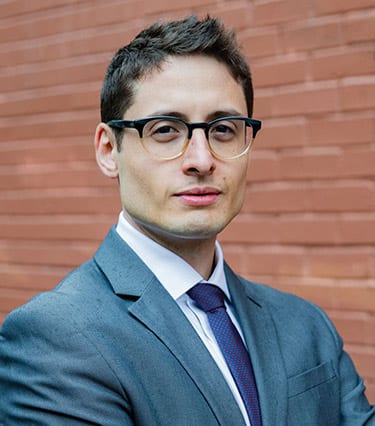
By Andrew Cohen
The story of Centro Legal de la Raza is one of desperation and dedication, setbacks and successes, grief and growth. Founded by members of Berkeley Law’s La Raza Students Association 50 years ago, the organization is celebrating its golden anniversary—and the law school’s vital role in its history.
Based in Oakland and focused on workers’ rights, tenants’ rights, immigrants’ rights, and youth development, Centro Legal serves area low-income, immigrant, and Latinx communities through bilingual legal representation, education, and advocacy. During a recent event at Berkeley Law, leaders past and present discussed the group’s dogged efforts, and how students have fueled its mission through volunteer work and internships.
Monique Berlanga ’08, who leads the organization’s Tenants’ Rights Program, vividly recalled the moment that propelled her to law school—and to Centro Legal. When she was in third grade, her family got a late-night phone call after her cousin was arrested for starting a fight.
“We needed to get enough money together for a lawyer, but we weren’t able to,” said Berlanga, a first generation professional. “He (eventually) was incarcerated, and I associate that with the fact that we didn’t have enough money to hire a lawyer … That was my motivation for law school. I wanted to bring power back to my community.”
As a Berkeley Law 1L, she attended a La Raza Students Association meeting and began volunteering at the Centro Legal Workers’ Rights Clinic. There, she promptly helped a low-wage client who hadn’t been paid receive the compensation he deserved.
“The privilege of doing that was really empowering,” said Berlanga, who joined Centro Legal full time in 2016 and has litigated over 1,000 cases defending low-income clients facing eviction.
A formative childhood experience also motivated Bianca Sierra Wolf, Centro Legal’s executive director from 2008 to 2016, when her father received misguided legal advice upon after learning that the house he bought was defective. “We lost the case, and the lesson I learned is that if you’re poor, you don’t get the same access to justice or quality of attorney.”
Uneven playing field
Raymundo Jacquez, who directs Centro Legal’s Youth Law Academy, noted that California is “about 45 percent Black and Latino, but the percentage of the state bar that’s Black and Latino is 7 percent. How can you have access to justice if you don’t have lawyers from your community?” The Academy provides internships, field trips to law schools and courthouses, and mentorship opportunities to help diversify the legal profession.
Centro Legal faced severe budget and staff cuts in the late 1970s and early 1980s, when California slashed numerous services for low-income residents, and again after the 2008 economic recession.
“You never know what the political winds are going to do,” said former president and executive director Victor Ochoa. “You just know that at any given moment, there may be a hurricane.”

Organization leaders have taken significant pay decreases over the years, and one executive director worked for 18 months with no salary. That commitment—and the dedication of Berkeley Law students—helped Centro Legal weather those storms.
“Time and resources are always finite, which is why having Berkeley Law student volunteers is a tremendous help,” said Tulio Ospina ’22, an immigrant from Colombia and former Centro Legal paralegal who introduced the speakers. “What sets Centro Legal apart is how much the community respects it. That said a lot to me about the kind of work it does.”
Working together
Centro Legal attorneys supervise two of Berkeley Law’s Student-Initiated Legal Services Projects, the La Raza Workers’ and Tenants’ Rights Clinic and the Berkeley Immigration Group. Both are primed to extend its legacy.
“My family and community definitely have encountered problems regarding access to representation and justice,” said Clinic Co-Director Alvin Arceo ’21, raised in a predominantly low-income neighborhood of color by immigrant parents. “I knew this was the perfect outlet to give back to my community. My time volunteering at Centro Legal has been inspiring, allowing me to see firsthand the impact that the attorneys have on their clients.”
The Berkeley Immigration Group prepares bond packets for detained immigrants, conducts know-your-rights trainings, observes court proceedings, and fundraises for an immigration bond fund. The group also invites immigration lawyers to talk with students, including two who represent mothers separated from their children at the border.
“Detained undocumented immigrants are not provided attorneys that can offer them helpful legal advice,” says Co-President Francesco Arreaga ’21. “Moreover, immigration judges are not independent because they’re employees of the Department of Justice … I wanted to make sure that students were made aware of these injustices and empowered to take action.”
His hope “is that when Centro Legal de La Raza celebrates its 100th anniversary in 50 years, the Berkeley Immigration Group will continue being their partner in justice.”